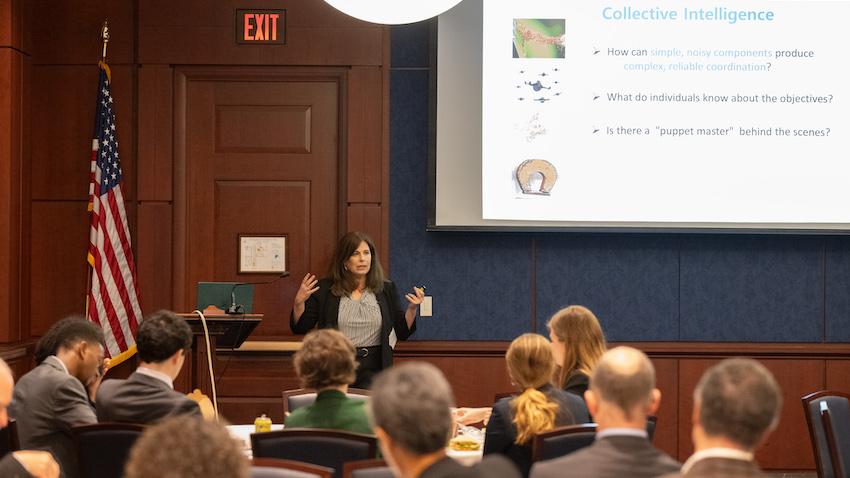
Professor Briefs Congress on How Randomness Impacts Elections, National Priorities
School of Computer Science Professor Dana Randall, a leading authority in the field of mathematics, recently delivered a Congressional briefing on the crucial connections between mathematics and national priorities.
The American Mathematical Society (AMS) and the Simons Laufer Mathematical Sciences Institute (SLMath) joined forces to co-sponsor the briefing on Capitol Hill, underscoring the significance of the topic and the collective commitment to its exploration.
Randall’s talk focused on the concepts of collective intelligence and randomness.
Collective intelligence involves harnessing the local behaviors of individuals to achieve a larger, coordinated global outcome. This principle finds practical application in various fields, such as the development of nano-robots that self-assemble for medical applications and the coordination of drones for collective tasks.
Another focal point of the briefing was the concept of randomness and how it can be used as a tool. Randall said many people falsely view randomness as “messy and unreliable.”
“The one thing I wanted people to understand is that it is often the opposite – it can make things far more reliable. Randomized algorithms are essential across these areas, and the concept of randomness needs to be understood better,” she said.
Randomness can be especially useful in statistical research, such as polling or analyzing maps used for political redistricting.
Randomness can also be an important tool for collective intelligence. Particles in a collective act locally and randomly in physics, but this enables them to be predictable and robust on a global scale. Randall believes similar concepts are at play when ants collectively build rafts and bridges for survival.
Randall, who is an adjunct professor in the School of Mathematics, said she chose to speak on these topics because they concern several national priorities from a theoretical perspective. She also wanted to emphasize the importance of math in these concepts.
Randall is using similar principles to engineer collectives to accomplish tasks that are beyond the capabilities of individuals. For the past five years, she has led a Multidisciplinary University Research Initiative (MURI) project focusing on collective intelligence and understanding how people can achieve positive global outcomes using noisy, locally interacting components.
As computing revolutionizes research in science and engineering disciplines and drives industry innovation, Georgia Tech leads the way, ranking as a top-tier destination for undergraduate computer science (CS) education. Read more about the college's commitment:… https://t.co/9e5udNwuuD pic.twitter.com/MZ6KU9gpF3
— Georgia Tech Computing (@gtcomputing) September 24, 2024


